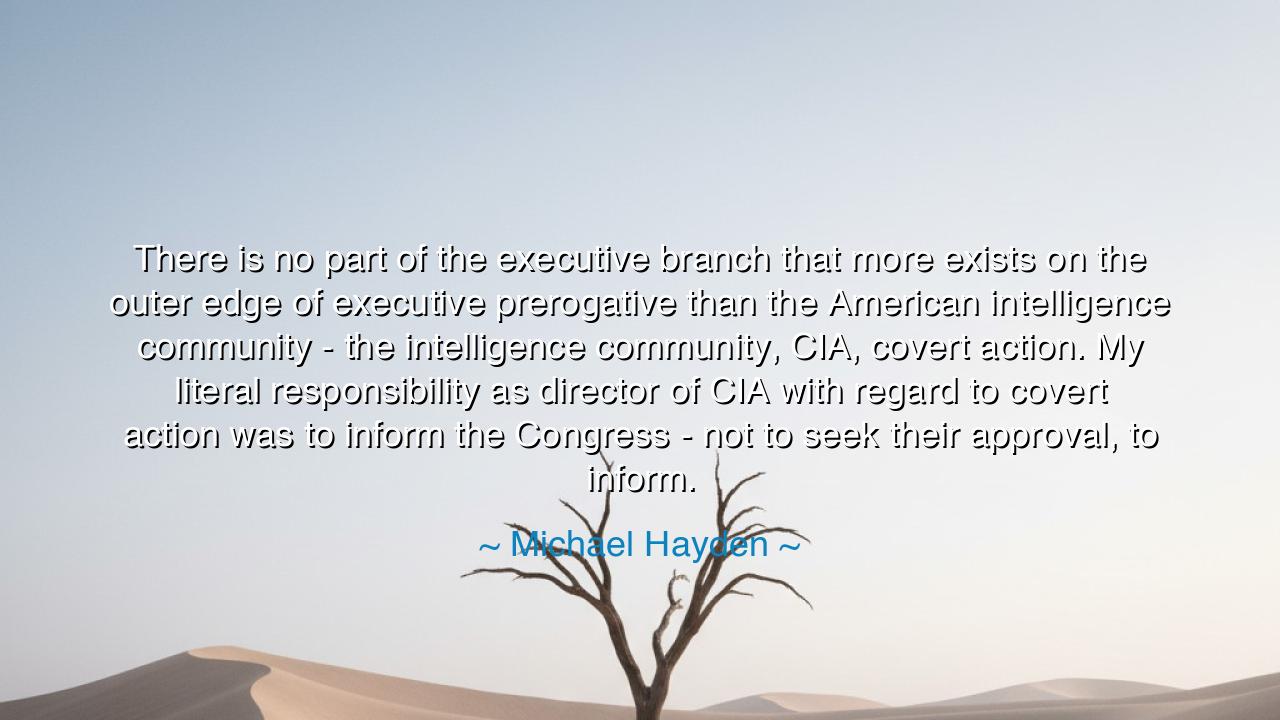
There is no part of the executive branch that more exists on the
There is no part of the executive branch that more exists on the outer edge of executive prerogative than the American intelligence community - the intelligence community, CIA, covert action. My literal responsibility as director of CIA with regard to covert action was to inform the Congress - not to seek their approval, to inform.






Hearken, children of power and prudence, and attend to the words of Michael Hayden, who once stood at the helm of unseen forces and spoke with the gravity of command: “There is no part of the executive branch that more exists on the outer edge of executive prerogative than the American intelligence community — the intelligence community, CIA, covert action. My literal responsibility as director of CIA with regard to covert action was to inform the Congress — not to seek their approval, to inform.” In these words lies a revelation about authority, secrecy, and the fragile balance between power and accountability, between the seen and the unseen pillars of governance.
Since the birth of nations, rulers have entrusted certain servants with hidden duties — tasks beyond the realm of public debate, meant to protect the realm from dangers too dark for daylight. In ancient courts and empires, these were the spies and envoys, the watchers and whisperers. Yet the power to act in secret is a perilous gift, for it resides upon the knife’s edge between defense and domination. Hayden’s reflection reveals the truth that the intelligence community lives upon this precipice, where decisions are made not under the law’s full light, but under the shadow of executive prerogative.
To understand his meaning, we must first grasp what that “outer edge” signifies. In the architecture of governance, the executive branch acts — it enforces, defends, and decides. Yet when it operates through the machinery of intelligence, it reaches into realms where oversight grows faint. Hayden, as director of the CIA, held authority over operations that shaped events in silence — actions too sensitive for open vote or public record. His duty, as he states, was not to request permission but to inform those elected to oversee him. Thus, the balance of democracy becomes a dance between secrecy and trust, between the protector’s discretion and the citizen’s right to know.
This tension has existed throughout history. Consider Queen Elizabeth I and her spymaster Sir Francis Walsingham, whose web of informants and coded messages shielded England from assassination and invasion. He too acted on the “outer edge” of royal prerogative — empowered to deceive, to infiltrate, to strike — not with the queen’s constant consent, but with her enduring trust. His methods were ruthless, his moral burden immense, yet without his vigilance, England might have fallen to its enemies. So it is with modern intelligence: its guardians bear both the glory and the peril of wielding unseen power.
Hayden’s words are not boast, but warning. To govern well is to understand the cost of secrecy. Every covert action, no matter how justified by national interest, erodes a fragment of transparency. Every decision made without consent risks alienating the very people it aims to protect. The American intelligence community, in its scope and capability, embodies both the strength and fragility of a free state — strong, because it can defend unseen; fragile, because it must do so without losing its moral anchor.
The lesson here is as old as empire: power requires restraint, especially when wielded in darkness. The wise ruler does not revel in secrecy, but regards it as a sacred burden. For just as fire both warms and burns, so too does covert authority safeguard or consume, depending on the virtue of those who wield it. Hayden’s acknowledgment that his role was “to inform, not to seek approval” lays bare the weight of responsibility upon such leaders — that they must govern not only by law, but by conscience.
Practical wisdom flows from this truth for all who hold or aspire to power. Whether in governance, business, or life, when entrusted with authority unseen by others, act with integrity. Be mindful that to operate in secrecy is not to be free from accountability, but to be bound by a higher duty to justice and truth. The outer edge of prerogative is not a place for indulgence, but for discipline, humility, and self-awareness.
Finally, let the listener remember: the strength of a civilization is measured not by how fiercely it guards its secrets, but by how honorably it wields them. Michael Hayden’s insight is both a testament and a warning — that the hand which operates in shadow must be guided by the light of principle. For when power in darkness forgets its purpose, it ceases to protect and begins to rule — and in that moment, the guardian becomes the threat it was meant to defend against.






AAdministratorAdministrator
Welcome, honored guests. Please leave a comment, we will respond soon